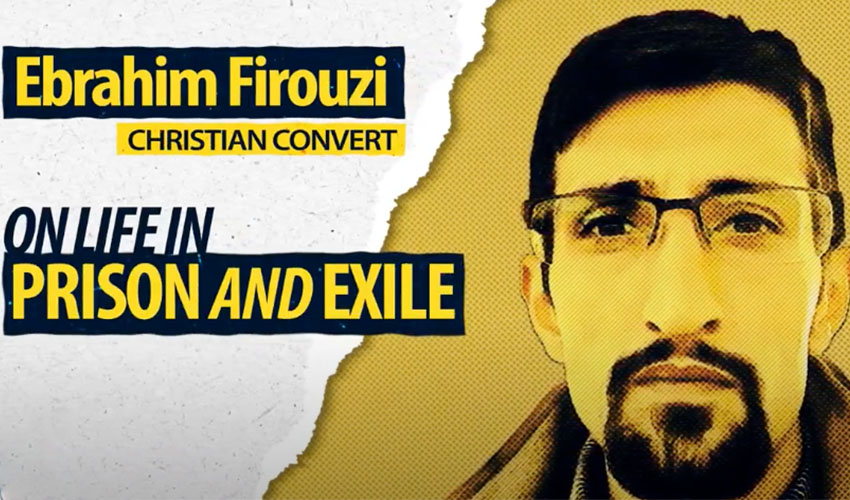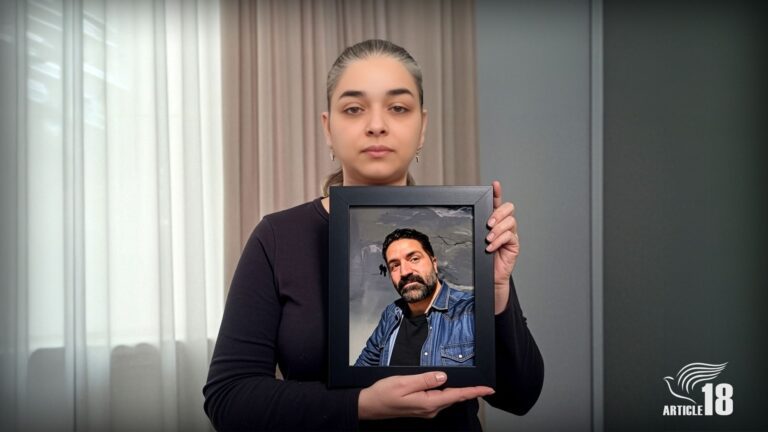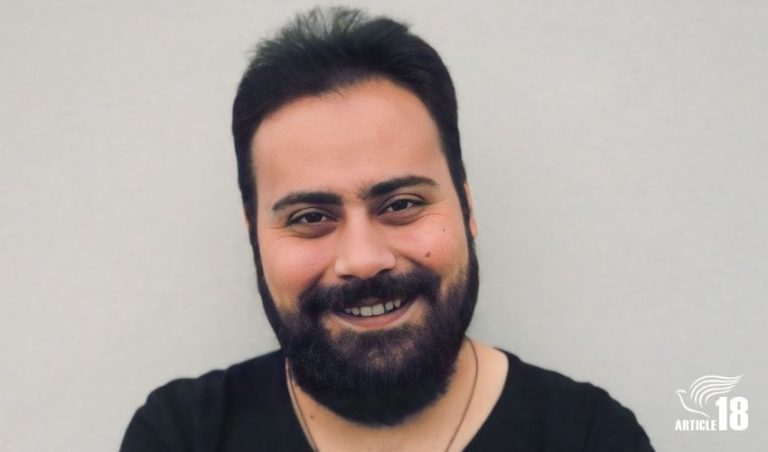Ebrahim Firouzi tells Article18’s advocacy director, Mansour Borji, about the months he has spent in exile since his release from six years in prison in November. Ebrahim’s two-year term in exile was recently extended by 11 months owing to an unauthorised leave of absence. You can read more about that here.
Can you tell us about where you are, how you are, and a bit about life in exile?
I am now living in the so-called “oil pin” of Iran, in the city of Rask, near Sarbaz, in the province of Sistan and Baluchestan.
About two weeks after leaving prison, I submitted myself here to begin the two-year exile that was issued to me in 2013. First I had to serve a few years in prison – six, seven years – and then it was time to serve this sentence.
Can you explain a little about the conditions in exile and what restrictions you face?
The rules in exile are the same for everyone, unless the judge included an additional limitation in the judgment. Thank God, the judge decided for me only the two-year forced stay here. There was no further limitation. Therefore, like everyone else who is in exile, I have to report to the police station every 24 hours, and declare my presence there. After that I can live the life on offer to me here. I am like other citizens.
Have you had the opportunity to call or to have visits from friends and family? If they were to travel there, would it be possible for them to see you?
Yes, it’s possible, but one must also take into account the distance, and that my circumstances here are not suitable for receiving guests.
I live a temporary life here, and definitely there is no opportunity for me to make a welcoming home that would be appropriate for guests. That is the first point.
The second point is the distance my family are away from me. If they were to travel this distance – for a day or two, or even a week – I would feel bad, especially since I do not have comfortable conditions for guests.
Since I have experienced prison myself, I can live in all conditions, but it’s different when it comes to family and guests. Since I hadn’t seen my sister for many years, she did come here four or five months ago, to see me for the first time in four years, and in the boot of the car she brought a sleeping bag, food and all other necessities with her. Such are my circumstances.
And I think it takes at least a few hours to get there? The last time you made the journey, how long did it take you to get to Tehran?
If someone wants to go to Tehran by bus, it takes 26 hours.
If someone wants to take the plane, the airport is not close to where I live, like a bus stop. I have to travel 200km from here, but not with just one means of transport – I have to use four different means of transport, and then I reach Chabahar Airport. From there you can take a plane to Tehran, which takes three hours.
Have you been able to get to know some local residents or neighbours? Do you get a sense of how they feel about you being among them?
On my first day, I arrived here as an exile and they didn’t know anything about me and hadn’t had positive experiences with previous exiles.
Also, I’m single, so it was very difficult to get an apartment. I have to pay for my life’s expenses myself. The police or the judiciary don’t care whether exiles sleep on the street, or wherever.
So I had a lot of difficulty renting an apartment, but when the locals understood my situation – I explained that it was true that I was an exile but that I was not a criminal – and then their perceptions changed. Because of the kindness of our Lord Jesus Christ, the first night, when many exiles sleep on the street, I was accepted and spent the night in the home of one of the residents.
And this person, the next morning, prepared an apartment for me, within a day, so that I could temporarily live there until, after a while, they provided more suitable accommodation for me to rent, and that’s where I’m living now.
Regarding the behaviour of the locals – and their feeling about me, or even that I’m a non-Muslim and most of them are Sunnis – one of the interrogators in prison knew about my exile, and he said: “We will not kill you, we will send you into exile where groups of Salafists and fanatics will kill you!”
Well, my time in prison came to an end and, with those thoughts in mind, after the prison sentence, I was given a two-week leave of absence to visit my family and to take care of official affairs before taking myself into exile here.
Before I was released, I informed the representative of the Ministry of Intelligence in Rajaei Shahr Prison, in writing and verbally, that I would shortly be exiled and that “all of my identity documents, which remained with you for seven years and you did not give them to me, I need them – otherwise, when I go into exile, I will be a person without identity, so how should the police or the judiciary know it is me?”
But no matter how much I called the Ministry of Intelligence from inside the prison, and then after my imprisonment – my brother called them too – they were not willing to give me my documents. My assumption is that the documents were lost and they didn’t know where they were, in order to return them to me.
But, thank God, I had copies which I had made years earlier and which had also been validated by the court, translated into English, and after a lot of difficulty, trouble and thoughts about where they were and where I had left them, I found them.
So those basically became my identity documents. Wherever I went and was asked for the original copies of my national ID card and birth certificate, I said, “I am an exile, this is my situation and these are copies and court-legalised translations, which have been validated by the judiciary; I can hand these over to you.”
So, despite the fact that they sent you into exile, they did not provide the minimum of necessities, such as identity cards and accommodation for the first two or three nights until you found a private place to stay?
No, they didn’t. I jokingly responded to a friend who said they would provide me with a home: “My brother, they have sent me into exile to make me suffer; they haven’t sent me on a honeymoon so that they would book me a hotel!”
And, unfortunately, poverty and restrictions are so high here, there is not even a guest house where I could go.
But thank God that as soon as it became known that I was only there because of my beliefs, these dear people accepted me as a guest on the first night. And the next day I was provided with another place to stay.
And how do people in the city feel about their home city being used as a place of exile?
Imagine that you are told that your home – we have a term in our dialect, “Olokueh”, meaning “rubbish dump”. Imagine someone saying to me, “Ebrahim, your house is a very dirty, ugly and useless place.” What kind of feeling would that give me if I lived in that place?
These people have exactly that feeling. Basically, those responsible [the government] say openly that this is a place where life will be very difficult. That is why they call it exile. But the people here live with dignity and honour, despite the hardships. And they know it’s difficult, but their dignity is so high that they don’t organise protests like people in other cities.
You were in prison for over six years and now you’re in exile. Can you explain your emotional state now? You must have had many highs and lows these last years?
Emotionally, you and other Christian friends who will hear this conversation will understand what I mean… The joy and happiness that everyone wants, for me it was sometimes more and sometimes less, just as everyone experiences it in his or her life. But the joy the Bible speaks of – and I encourage those who don’t know to read about it – this joy was always with me and always will be with me. Even now.
But humanly there were incidents that were painful for me – the death of my mother, the marriage of my only brother. Definitely, these were incidents that would be sad for everyone, from a human perspective.
There was one more difficult incident – and I think it was the only night in prison when I cried for hours: a family matter that cannot be told publicly. But the joy of the Lord, and the trust we have in God, helps us to keep going, and it has guided me so that I never felt, in simple terms, that I had reached my limit.
Basically, I only prayed for my freedom once in all these years, and that was during my first court case, and I was released two days later.
Since then, I know that many have prayed for my freedom, but personally I have never prayed for my freedom. I have always prayed: “God, your will be done. It was your will that I go to prison, I’m sure of that; so I trust in your plan. Give me the strength to live in the right way until the end.”
This is always my prayer, and friends who always sent me messages like “We pray for your freedom”, I always thanked them, but I asked them to pray for me only that God’s will be done for me in prison.
But anyway, being out of prison is just like being in prison, only that the room is bigger.




0 Comments
Trackbacks/Pingbacks